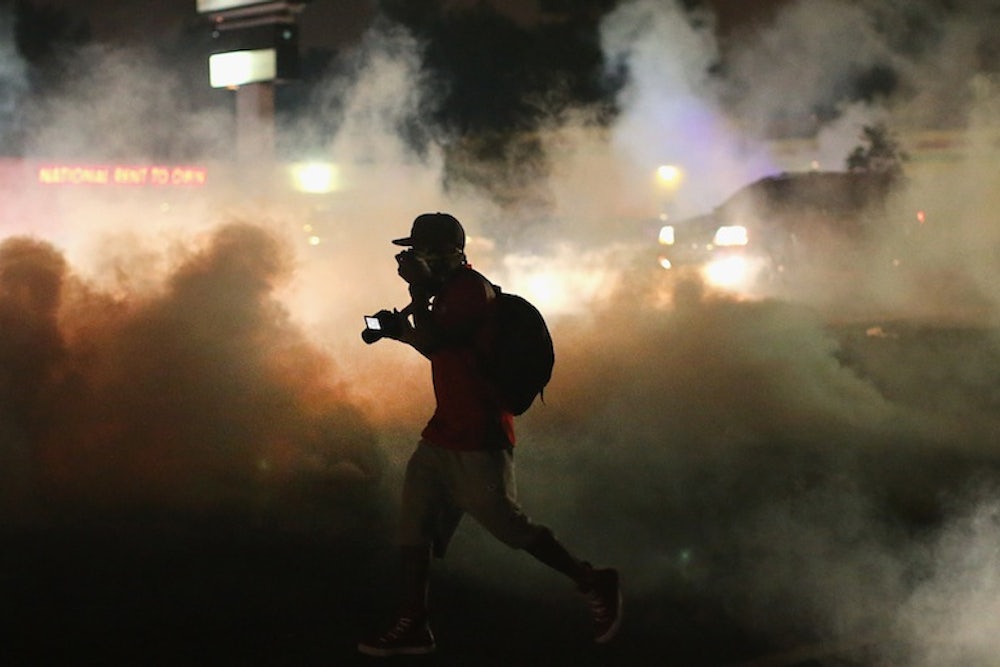Unrest escalated in Ferguson on Sunday night and into Monday morning. Reports suggest that, amid mostly peaceful protests, there was looting and some acts of violence—including the lobbing of Molotov cocktails at police. In response to what he called “deliberate, coordinated and intensifying violent acts,” Missouri Gov. Jay Nixon announced that he will deploy the National Guard to the St. Louis suburb.
In short, the controversy and upheaval over the death of Michael Brown, the 18-year-old African-American shot by police, isn’t going to end anytime soon.
Indeed, the calm last week, when the Highway Patrol stepped in to take over on the ground, did not last very long. One reason is that Ferguson police on Friday inflamed the situation—most notably, by releasing a video that purportedly showed the teenager robbing a convenience store before his death. Federal officials later said they urged Ferguson police not to publish the video. The move undermined the fact that police on Friday finally did something protesters had long demanded—they released the name of Darren Wilson, the officer who shot Brown. A midnight curfew order in Ferguson followed the day after.
The Department of Justice has escalated its involvement. It is conducting its own autopsy of Brown’s body, in addition to investigating whether Brown’s death was a civil rights violation. The Justice Department’s autopsy will actually be the third examination of Brown’s body. The police conducted one, but have not yet released the results. A private autopsy, commissioned by the family, found Brown took six bullets, including a fatal one that suggests he was bent over at the time.
The Justice Department’s actions may not end with the investigation. And that may be a good thing. As criminal justice and civil liberties expert Samuel Walker told me in a phone call, even a criminal prosecution of Wilson would not be enough to fix the wider problems within the Ferguson police force. Eventually, the Ferguson police could enter into an agreement with the Justice Department to reform its practices. Close to two-dozen cities have entered into similar “consent decrees” since 1997. An example is Los Angeles, which agreed to change its practices following a long, well-publicized history of police misconduct.
The LAPD department still has a way to go, by most accounts, and the recent shooting of an unarmed man in Los Angeles provoked hundreds to march against the LAPD. But, according to Walker, Los Angeles is a “better police department today than it was 15-20 years ago,” because of its years of reforms it undertook as part of the consent decree. Maybe someday people will be able to say the same thing about Ferguson’s police.
—Rebecca Leber
Things to know:
RICK PERRY: A grand jury indicted the Texas governor over the weekend, alleging that he violated state laws against abuse of power. The supposed abuse came when he vetoed funds for a state agency on public integrity whose director, a Democrat, refused to step down after being arrested for driving under the influence. Yes, it’s a messy situation. Even liberals likeJonathan Chait think the charges are ridiculous. (New York) Alec MacGillis, who has reported extensively on Perry, agrees that the charges are awfully thin—but, he notes, they are also fitting. (New Republic)
ECONOMY: Finally, job growth in high-wage sectors is picking up. (Ylan Q. Mui, Washington Post)
Yikes: Jake Halpern takes a long look at the dark world of consumer debt collection. It's a nasty, often illicit system where everyday Americans frequently end up getting hurt. (New York Times)
CLIMATE: When anonymous and off-the-record, many Republicans will admit they support taking action on climate change. The fear of a primary challenger prevents them from speaking publicly about it. (Bloomberg BNA)
Articles worth reading:
How to spot the five biggest lies about Obamacare. Michael Tomaskyreminds people that the apocalyptic predictions about the law have not come true. (Daily Beast)
How to read the coming news on Obamacare. Joanne Kenen, from Politico, explains how to interpret the data when states release information about next year’s insurance premiums. (Covering Health)
Don’t blame Republicans. Blame James Madison. Philip Klein says that liberals should stop complaining about small states having too much power. The Framers of the Constitution wanted it that way. (Washington Examiner)
Learning from Picasso—and John Lennon. Joshua Wolf Shenk explains why creative genius is usually a product of cooperation and competition, rather than a solitary act. It’s an excerpt of his new book on the subject. (Salon)
Why Dupont Circle is better than Tyson’s Corner. Emily Badger spotlights an innovative new study suggesting that living in sprawl is bad for your health. (Wonkblog)
Stories we’ll be watching today:
Ferguson.
At QED:
Two stories you won’t want to miss at the New Republic today: Ben Crair has dug up emails to and from Ohio officials, discussing new drugs for lethal injection of prisoners. In the emails, they discuss concerns that prisoners would “gasp” and “hyperventilate” during the execution process. Also, Judith Shulevitz looks at the exploding field of epigenetics, its focus on how the behavior of pregnant women can influence the health and well-being of their children, and ponders the implications for feminism.
A previous version of this article attributed a story to Bloomberg. It has been corrected to Bloomberg BNA.
